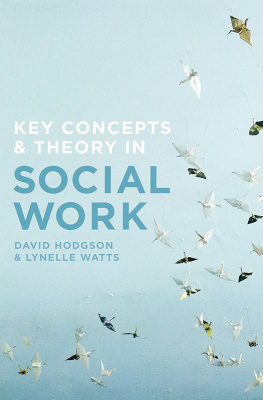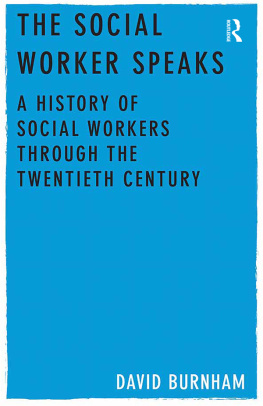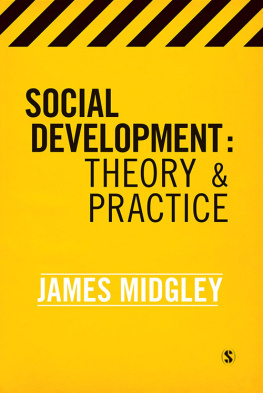KEY CONCEPTS AND THEORY IN SOCIAL WORK
KEY CONCEPTS AND THEORY IN SOCIAL WORK
DAVID HODGSON AND LYNELLE WATTS

David Hodgson and Lynelle Watts 2017
All rights reserved. No reproduction, copy or transmission of this publication may be made without written permission.
No portion of this publication may be reproduced, copied or transmitted save with written permission or in accordance with the provisions of the Copyright, Designs and Patents Act 1988, or under the terms of any licence permitting limited copying issued by the Copyright Licensing Agency, Saffron House, 610 Kirby Street, London EC1N 8TS.
Any person who does any unauthorized act in relation to this publication may be liable to criminal prosecution and civil claims for damages.
The authors have asserted their rights to be identified as the authors of this work in accordance with the Copyright, Designs and Patents Act 1988.
First published 2017 by
Palgrave
Palgrave in the UK is an imprint of Macmillan Publishers Limited, registered in England, company number 785998, of 4 Crinan Street, London N1 9XW.
Palgrave and Macmillan are registered trademarks in the United States, the United Kingdom, Europe and other countries.
ISBN 9781137487834 paperback
This book is printed on paper suitable for recycling and made from fully managed and sustained forest sources. Logging, pulping and manufacturing processes are expected to conform to the environmental regulations of the country of origin.
A catalogue record for this book is available from the British Library.
A catalog record for this book is available from the Library of Congress.
DEDICATION
This book has its origins in countless conversations we have had with each other and with our students over many years of teaching social work. We would like to dedicate the book to the many social work students we have taught, past and present. We agree with sociologist Michael Burawoy that students are our first public (Burawoy, 2014, p. 1608).
LIST OF TABLES
FOREWORD
Professor Karen Healy
Each age brings new opportunities and challenges. For some, today is a time of opportunity. Advances in public health and medical care have extended the average length and quality of life with the advantages of these developments flowing most strongly to middle to high income people in wealthy countries. Developments in information and communication technologies has connected people to each other and to services and resources in ways never before thought possible. For example, tele-health, that is, health services delivered via information and communication technologies, have enabled people to access a range of health and personal care services remotely. In many wealthy countries, more people are completing tertiary education than ever before and these highly educated populations are well equipped for employment opportunities in the new knowledge and service economies.
Despite the promises of our age, many people are left behind. Disadvantaged people continue to bear the disproportionate burden of poor physical and mental health and are more likely to die prematurely than their wealthier counterparts (Wilkinson & Pickett, 2008; see also Gallagher, Jones, McFalls, & Pisa, 2006). Disadvantaged people are also less likely to have access to information and communication technologies through which a host of resources and services are now routinely delivered. Our super-diverse societies continue to be places of oppression for many Indigenous people and for those who are excluded from the educational opportunities needed to participate in the new knowledge and service economies.
What kind of knowledge and skills do social workers need in our changing world? This is a question that our profession has grappled with since its inception and which underpins this book. As a profession that seeks to understand and respond to people in their environment, social workers have always practised with a view to both individual and social change. David Hodgson and Lynelle Watts maintain this dual focus. They note that our profession is united by its commitment to working alongside people who experience exclusion, disadvantage, stigma and marginalisation. We are committed to achieving change through partnership.
This book spans the multiple systems impacting on social work practice. At a local practice level, this book reinforces longstanding principles of social work including the promotion of human dignity, human rights, and social justice. It also extends these principles by encouraging the reader to consider dimensions of human experience often overlooked in social work texts, such as the spiritual aspects of human need. We are encouraged to critically analyse relations of power within our practice environments and to challenge a narrow focus on risk management. We are invited to consider the possibilities for social workers to broaden the focus of our practice towards holistic and respectful partnerships with people who use social work services. This book provides the emerging social worker with a useful framework for negotiating the contemporary challenges of change.
References
Gallagher III, B. J., Jones, B. J., McFalls, J. A., & Pisa, A. M. (2006). Social class and type of schizophrenia. European Psychiatry, 21(4), 233237.
Wilkinson, R. G., & Pickett, K. E. (2008). Income inequality and socioeconomic gradients in mortality. American Journal of Public Health, 98(4), 699704. http://doi.org/10.2105/AJPH.2007.109637
ACKNOWLEDGEMENTS
It is something of a truism that writing a book, in fact writing anything, wouldnt happen without the support of others. This has certainly been the case here. We would like to acknowledge and thank Helen Caunce, Peter Hooper and Louise Summerling from Palgrave. Thanks to Helen for her encouragement in the early stages of the proposal process. We thank Peter Hooper for sending the encouraging and supportive emails as we were writing it and for helping us to work through the final stages. We would like to thank Professor Karen Healy for writing the foreword. For all kinds of support (too various to name) we would like to thank Dr Sharlene Nipperess, Professor Donna Chung, Jacquie Tarrant, Priscilla Vindin, Merle Ann Cochrane, Hovea Wilkes and Jennifer Alamdar. Special thanks to Cherryl Beard and the student central crew at ECU, Sarah, Gemma, Beth, Maddie, and Glenys an incredible cheer squad for inviting us to hang out occasionally where the conversation was not about writing and deadlines. Many other colleagues and friends have provided support in so many different ways that it is impossible to include all these contributions except to say we are very grateful.
The book was written in a number of places in addition to our offices. We would like to thank the crew at Caf Bean in Bunbury, especially Emma and all the staff there who made us feel so welcome every week. Its a lovely space to write and the coffee is good too. We are grateful also that a few folks offered spaces to use for writing retreats. We owe a huge thanks to Gayle Hall for lending us her house in Collie and to Alan and Mia for the use of their house while they were away in the North of Australia over the winter months.
During the writing process we were greatly helped by a number of people who read various chapters and gave us feedback on the work at different times. For this we thank Andrea Hodgson, Megan Watts, Gayle Hall, Professor Kathy Boxall, and especially Nina Tinning. Nina read almost the entire book and provided critical feedback that gave us important encouragement to keep going. We are also very grateful to Graham Hodgson who cast his proof editing eye over the text and gave it back to us with sticky flags and good advice to follow in the interests of clarity.
Next page






